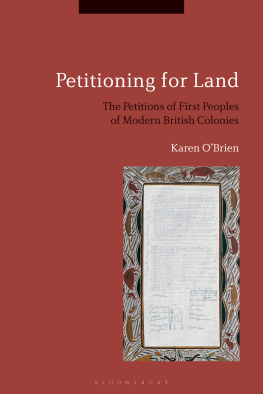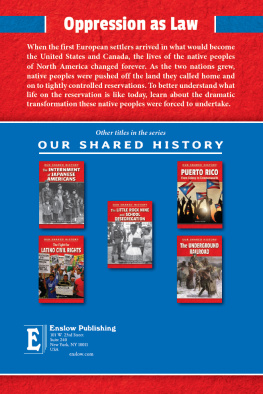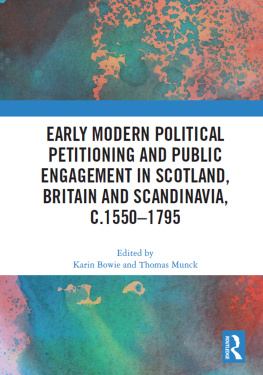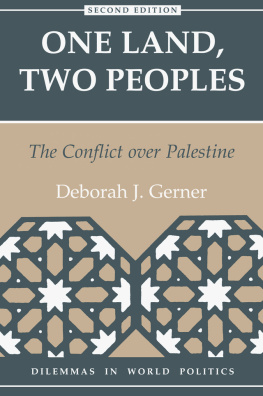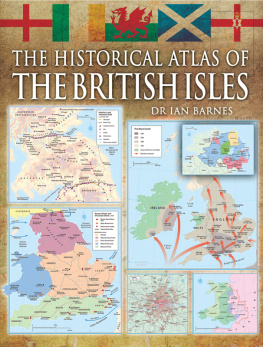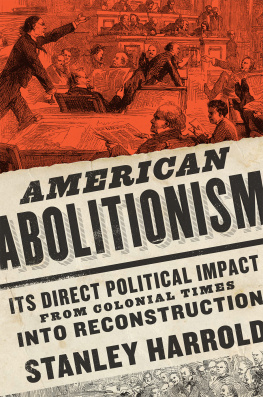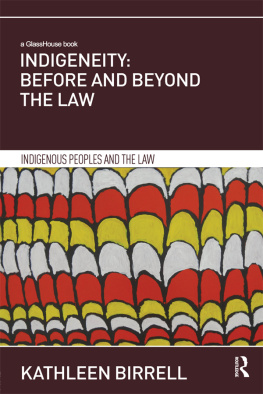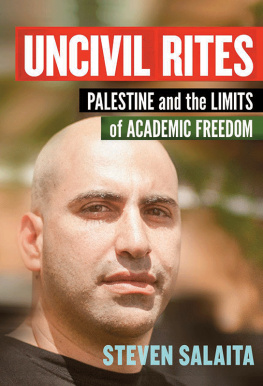Petitioning for Land
Petitioning for Land
The Petitions of First Peoples of Modern British Colonies
Karen O'Brien

Contents
I would like to thank the University of Sydney, School of Social and Political Sciences and the Faculty of Arts and Social Sciences for its support. The Australia Research Council Centre of Excellence for the History of Emotions provided a grant for which Im most grateful. Researchers, Susanne and Anastasia, provided assistance, for which I am very thankful.
First Nations challenged British colonial authority from the earliest days of colonisation through the act of petitioning. In an analysis of these First Nations petitions, this book follows a process of negotiation and diplomacy and offers a comparative First Nations geopolitical account of the Yuin, Yorta Yorta, Kulin and Yolgnu of Australia, the petitions of First Nations Americans, such as the Cherokee, the Moqui, Maumee and the Pequot. It investigates a range of legal challenges that were presented in the petitions of the Mtis people, the plain and wood Cree, Salteaux, Blackfeet and Piegan of the First Nations of Canada. It considers the petitions of the Mori of New Zealand and reflects on the petitioning requests for adherence to Nunukus law of non-violence that was initiated by the elders of the Moriori people of Rekohu. First Nations American women of Boston, such as Mary Sampson and Nuthcuncom, voice their concerns through their petitions that were presented in 1675. They communicate the struggle of the social conditions that First Nations women faced in the aftermath of colonial violence. Even in such hostile social conditions, First Nations petitioners were consistent in the pursuit of self-government. Such was the case with First Australian, Creighton Uniapon, who, centuries later, in his petition, drew attention to the dire circumstances of inequality that existed in his community and subsequently petitioned for a change of policy at Point Macleay Mission. Likewise did petitioner, William Bray, of Alice Springs, who formally insisted on his right to remain on Country, was critical of authority and asserted his disapproval of the Training of Children Act of 1923 which sought to remove children from the family home to be trained as servants. Similarly, the petition of the Women of Broome lobbied to prevent the removal of their children and formally requested redress against the domestic servitude imposed on their children by the Training of Children Act, 1923.
Further petitions that show how, during colonisation, First Nations were forced to conform to the legal and moral values of colonial rule are examined in the paragraphs that follow. The redress of grievances and petitions for justice were comparable in the newly established British colonies of Canada, Australia, New Zealand and America where the application of English common law was indiscriminate. First Nations American petitions were presented in the first decades of the seventeenth century, while the petitions of the other British colonies were presented a century or more later when the socio-legal implications of British colonisation were enforced. Colonial British rule was imposed by means of local officers and administration. It was simultaneously resisted but also utilised as a measure of redress and negotiation by First Peoples who were often forced into conflict during the annexure of their land for the purposes of economic expansion. The specifics of their petitions comprise evidence of their commitment, their resilience and the level of emotional investment that was indispensable to the confrontation of such violent oppression.
This is primarily a socio-legal study of First Peoples reactions to the imposition of colonial intrusion and acts of law. It charts the progression of a continuous line of questioning of the imposed asymmetry of power relations in an interrogation of the enforced conditions of inequality that was articulated by the means of petitioning. It contributes to knowledge of the presentation of equal standing in colonial interactions and establishes how colonial relations were consistently negotiated through an Australian interstate examination of the range of petitioning, with a thematic investigation of child removal, the conditions of pseudo-slavery, the dislocation of First Nations from traditional lands and First Nations land rights. The imposition of colonial excise of land for economic expansion is clearly opposed and such opposition is imparted in the writing of the petitions. The colonial approach to land ownership bears little comparison to either First Nations philosophies of prior land ownership or their interpretations of the ongoing efficient management of First Nations land. In response to settler methods, First Nations petitioners opposed the colonially ascribed identity. They rejected the blood quantum perception of race that was inherent in the ideology of slavery. The book explores a great number of cases in which First Nations American petitions communicated their opposition to the Eurocentric colonial interpretations of First Nations identity and way of life and voiced their opposition to colonial impingement in their petitions. These petitions are the subject of an intensive investigation below.
An extensive geographical and chronological span reflects the uneven patterns of colonial establishment. An expansive chronological timeframe is necessary so as to take into account the range of land-focused petitions across the longue dure. As a result of the divergence in colonial expansion, together with the First Nations response in petitioning to avert colonial economic expansion, an expansive periodisation incorporates an exploration of the early petitions of First Nations America of the seventeenth century throughout the eighteenth and nineteenth centuries in the First Nations of Australia, Canada and New Zealand to the continuing petitioning for redress of grievance of contemporary society.
For First Nations, the loss of land and independence was at stake. Petitioners expressed their objections to the colonial bid to ensure their domination most vociferously. They objected strongly to the methods of colonisation in petitions. An examination of the conditions in which treaties were initiated offers a perspective of the early events that were encountered by First Nations of America, Canada and New Zealand. Treaty-making is compared with the situation encountered by First Australians where no treaties were enacted. The act of treaty-making, where the motivating force for the treaty is initiated from above, is unlike that of the petition, as a tool of resistance which is driven from below at grass roots level imparting First Nations community interests. While also providing an account of the experiences of agreement-making, First Nations petitions register very early experiences of colonisation. Treaties, however, are examined here as tools of colonisation, that is they represent the top-down approach of successive colonial governments to secure a non-violent, passive acceptance of the excise of First Nations land. British colonisers failed to recognise the violence that they initiated to secure economic expansion, and misrepresented their violent incursion as a peaceful cooperation between settler and First Peoples and simultaneously pursued a policy of aggression to acquire traditional lands for the purposes of economic expansion.
First Nations land ownership and culture were at stake. A qualitative investigation of more than 300 petitions pertaining to land ownership reveals an extensive body of formal requests that petition for the recognition of First Peoples prior ownership of land. The book constitutes an archive conscious, document-driven, First Nations account of petitioning. Through a combination of historical and socio-legal methodologies and a qualitative chronological evaluation of petitioning, this book sets out a socio-legal thematic framework of requests and appeals for the legal recognition of prior land ownership across a broad comparative area in a geopolitical assessment of petitioning in Australia, Canada, New Zealand and America. Petitions stand apart from other primary colonial sources of information in that they contain the actual voices and narratives of First Nations petitioners. They form significant political, legal and historical documentation of First Peoples resistance to colonial dominance and First Nations appeals and requests against land excise. Here, numerous case studies of petitions amplify, clarify and contextualise the subject matter of First Nations petitions where appellants speak directly through the petitions to the governing body. Their thoughts and narratives are explored in a telling of events just as they appear written in the petition and in a way that sheds light on First Peoples aspirations and achievements.

